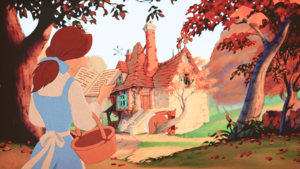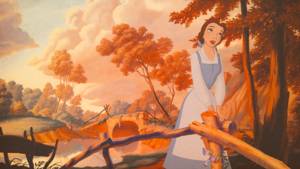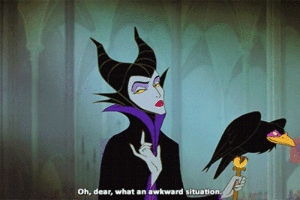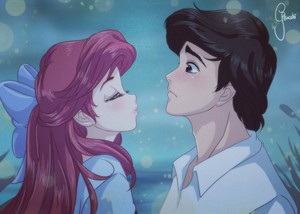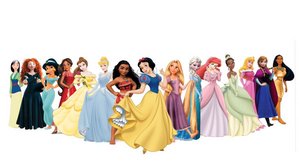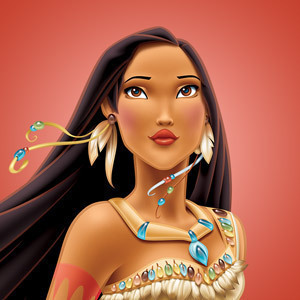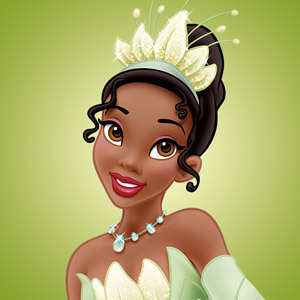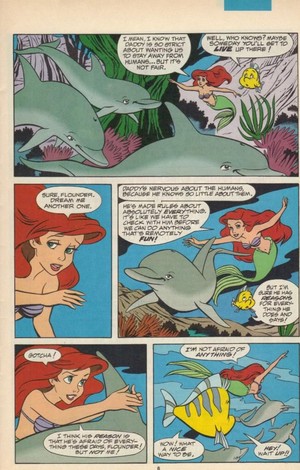You'll notice that characters created around the same time as each other tend to share traits that are 人気 at the time または big with the artist/director/etc who works with them.
However, I'm not here to talk about personalities. Those have already been covered によって many interesting authors who explore the topics far もっと見る effectively than I could. What I want to talk about is common overarching themes I have noticed in each generation of princesses.
Classic Princesses
A common theme with the first three ディズニー princesses (Snow White, Cinderella, and Aurora) I think is maintaining hope and optimism in the face of adversity and misfortune. Someone on this site mentioned that one thing they all have in common is they face a terrible circumstances imposed によって evil female figures (the Queen, Lady Tremaine and Maleficent) but stay optimistic despite it and make the best of a bad situation. I think it's worth exploring.
Snow White finds herself in a horrible situation when she discovers that her stepmother, the Queen, wants her dead, and the only reason she's alive is because of the good will of others. (The Huntsman sparing her, the 動物 helping her, and the seven dwarves allowing her to stay.) Despite this, she decides not to let fear get the best of her (as she beautifully demonstrates in "With a Smile and a Song"), and to make the best of a bad situation ("Whistle While あなた Work" anyone?)
Cinderella, likewise, finds herself in a horrible situation when her stepmother usurps her father's château shortly after his death, verbally and emotionally degrades her, and eventually reduces her to a servant in her own home. Like Snow White, she does not let this get the best of her. She retains her kindness and classiness in the face of degredation, holds onto optimism that things will get better ("A Dream Is a Wish Your ハート, 心 Makes") and make the best of a bad situation with as much cheer as she is able.
While Aurora is not initially aware of how much she has lost, as the 妖精 do not tell her she is a princess forced to live as a peasant to save her life, she is aware that she is not allowed to meet anyone. While Briar Rose is content with her many animal friends, she sees the happiness of birds in 愛 and longs for that kind of 愛 in her own life. (I call it the "Adam Alone in the Garden of Eden Syndrome.") However, while she is very wistful of her fate, notice that she keeps her good cheer as she tells the 動物 of her dream prince, and how he is not real. Notice that they are devastated for her, but she takes it in stride and continues to enjoy their company. In fact, she is good-natured enough to laugh and play around with the idea when some of them 表示する up dressed as her dream prince, and is able to have fun with them over it. Of course, she changes her tune when she falls in 愛 for real (though it does require suspension of disbelief that she would 愛 that quickly), but 愛 ロスト hurts もっと見る than 愛 hoped for.
Renaissance Princesses
Thanks to changing societal values and roles for women, the idea of a passive but optimistic princess that makes the best of a bad situation until her dream of 愛 and marriage comes true was no longer considered as appearing for general audiences in the early 90s. Renaissance Princesses shifted the focus away from making do and focused もっと見る on a theme of breaking out of traditional gender roles, defying patriarchy and actively pursuing their dreams. I think defying patriarchy is an especially strong theme, as standing up to fatherly figures または oppressive male systems seems to be a huge running theme through the ディズニー Renaissance.
Ariel: is a mermaid who is not happy living on the sea floor and pursues a new life on land. While her overbearing patriarchal figure of a father tries to keep her in her designated role under his ocean (reminiscent of a man keeping a woman in the ホーム and away from the outside workforce), she defies the role her father chooses for her and goes after what she wants in the world outside her home.
Belle: is an avid reader and whimsical daydreamer that craves adventure. Despite the expectation that she should want to get married, have kids, cook, clean, and wait on her husband hand and foot (literally), Belle rejects this traditional gender role pushed on her によって society and continues to long for magic and adventure. While she gives this up to save her father from an icy death in a アナと雪の女王 dungeon, she does so on her own terms and direct opposition to the wishes of the men in her life. She ignores her father's insistence that she go without him and saves his life out of determination. She rejects the Beast's attempt to literally bully her into liking him ("You will 登録する me for dinner. That's not a request!" "If she doesn't eat with ME, then she's doesn't eat AT ALL!") and only starts to come around AFTER he becomes the kind of person SHE likes. (Kind, gentle, sweet, shy, etc.) Last but not least, after returning to the village with her father, Belle refuses to let Gaston または the town blackmail her into marrying him.
Jasmine: rejects a life of idle luxury, sitting around doing nothing but getting dolled up for some suitor to pursue her in his own quest for political power. She ignores her father's insistence that she marry a prince within the allotted time, rejects smug suitors that treat her as just another pendant to add to their already well-adorned arms, puts the misogynistic and condescending Jafar in his place at every turn, and does not let アラジン get away with behaving like the men in her life she's already disgusted with. She also does not take to being lied to, または having her decisions または future made for her. Only when the men give her もっと見る freedom and treat her with respect and equality does she start to warm up to them.
Pocahontas: rejects her father's insistence that she live a steady, quiet life as the steady, quiet wife of a handsome sturdy husband to build handsome sturdy walls. Her free spirit rejects such a confining life chosen によって her father and would-be fiancé and seeks excitement and adventure through the unknown. She finds a kindred spirit in the exotic (to her) John Smith, who also longs for adventure in her "New World," and the two bond over their mutual fascination with each other's world. However, she is also quick put John Smith in his place when he tries to imply that her people, her culture, and her world should be "improved" によって becoming like him and his country. If あなた accept the literary theme of nature symbolizing femininity and buildings representing masculinity, and the settlers subjugating the land being symbolic of men subjugating women, then it has a very powerful anti-patriarchal theme. Finally, Pocahontas rejects the traditionally considered "masculine" institution of war and promotes the traditionally considered "feminine" goal of peace and understanding (aided によって her Grandmother Willow and her Mother's Spirit) when she tries to stop the fighting between the natives and settlers.
Mulan: A clumsy, awkward, socially inept introvert that tries and fails to live up to the expectations her society places on her. To be a "perfect bride," "perfect daughter," gentle lamb" (deleted scene) and a "perfect 磁器 doll." In a slight variation, ムーラン WANTS to fit in with her society, but finds she is unable. Only when she risks her own life to save her father, takes his place as a soldier in the army, and succeeds at fighting like a man does she start to discover her talents and herself. However, the movie digs a bit deeper によって 表示中 that she does defy the men in her life and the patriarchal system to obtain her goals. She steals her father's armor and takes his place in the army obviously without his consent, disobeys Shang's order to leave the army twice. First, in her attempt to prove herself when she retrieves the arrow, then later to save China when she discovers the Huns still live. She also defies the masculine gorilla Huns によって taking them out with her female ingenuity over masculine brute strength (starting an avalanche with a single canon, and later taking them out with womanly wiles and a fan, etc). Notice the men fail to enter the palace through conventional male warfare または brute strength によって bashing in the door, but are able to get in によって using women's scarves, and are able to take out the Huns によって disguising themselves as women. In fact, ムーラン ultimately wins によって combining femininity with masculinity.
Modern
While the Modern princesses also tend to defy tradition and actively pursue their dreams (Tiana for her restaurant, Rapunzel for the floating lights, Merida for her freedom) the bunk against patriarchy has largely subsided. Tiana struggles against race and class barriers to follow in her daddy's footsteps, Rapunzel struggles with restrictions placed on her によって her mother, Merida gets along perfectly with her father and brothers but rebels against her mother, and Elsa and Anna struggle with the life pushed on them によって both their parents. In fact, patriarchy is a complete non-issue for the last two.
So, what is the common theme of Modern Princesses? I suspect the answer is: exploring positive and complex relationships between female characters. Think about it. The Classic Princesses struggle with misfortune against a malicious female figure: Snow White under her stepmother the Queen, シンデレラ under her stepmother Lady Tremaine, and Aurora first under the snubbed Malecifent, then to a much lesser extent the three 妖精 who reveal they've lied about her her entire life, forbid her from being with the 愛 of her life, and seemingly condemn her to a loveless marriage and a royal duty she does not want.
While the Renaissance Princesses are not beset with negative female relationships per se, they also don't have strong female relationships at all. Ariel has a deceased mother, many sisters that she *barely* interacts with, and mostly interacts with her father and male friends. Belle has no mother, sisters または close female フレンズ to speak of. ジャスミン has no mother, sisters または close female フレンズ in sight. All the important people in their lives are male. Pocahontas is a mixed bag. While she has her Grandmother Willow, Mother's Spirit and friend Nekoma, the film focuses もっと見る on her struggle with patriarchy and bigotry もっと見る than her relationships with other female characters. ムーラン has a good relationship with her mother and grandmother, but the focus of the story is her bond with her father, army comrades, commanding officer Shang, and male sidekicks (Kahn, Mushu and Crickey).
I feel the Modern Princesses not only drop the struggles with antagonistic matriarchal and patriarchal figures, but add exploration with positive female relationships not seen in ディズニー 映画 before (except maybe with Aurora and Pocahontas).
Tiana's deceased parent is her father, so we get to see her interact with her mother the way no ディズニー Princess arguably could before. The real crown jewel is her friendship with her best friend シャルロット, シャーロット though. While the two have such different personalities, 閲覧数 and goals, the two are still very close and support each other. While Tiana doesn't think much of Lotte's desire to wish on stars, marry a prince and be a princess, she is genuinely happy for her friend when it seems Lotte gets her wish after "Naveen" shows at the ball. What really shines though is Lotte's loyalty and devotion to Tiana. When Tiana accidentally ruins her 表, テーブル full of "man-catching beignets," Lotte is not only not angry, but immediately leaves her prince charming on the dance floor to help Tiana get cleaned up without a 秒 thought. The crown jewel of "sisters before misters" comes near the end though, when シャルロット, シャーロット is moved to tears of happiness for her friend finding love, and agreeing to キッス him "For you, honey. No marriage required." The love, loyalty, devotion and joy she feels for her friend, even at the cost of her own dream, is nothing short of beautiful. I feel like this was the first ディズニー movie to really 表示する the importance of close platonic female friendships, and it most certainly wasn't the last.
Rapunzel is a mixed bag, but I feel it explores some positive, または at least complex, aspects of mother-daughter relationships rarely seen in... any films. The movie could have adapted the story of the evil, ugly witch that keeps the kidnapped girl prisoner, but instead they went the "Into the Woods" route of portraying a very loving--if strained and possibly one-sided--mother-daughter relationship. While Rapunzel is confused and increasingly disillusioned over why her "mother" won't let her go outside, she obviously loves and trusts Mother Gothel very much. (And is genuinely dismayed によって her death.) While cruel, possessive, manipulative, and possibly incapable of feeling 愛 as we know it, many of Gothel's interactions with Rapunzel come across as genuinely motherly and affectionate... until she is driven over the edge. Then, while Rapunzel is only on-screen with her real mother for about thirty 秒 near the end, we can infer that the クイーン is very kind, loving, and supportive, and that their tearful embrace is the beginning of a lifelong, loving relationship. Either way, the film deeply explores an interactive mother/daughter relationship not seen in ディズニー films before.
Merida: Need I explain? While Merida and Elanor butt heads もっと見る than rams in mating season, the point of the film is about "mending the bond torn によって pride." The two were so close when Merida was little, but grew apart as Merida grew もっと見る opinionated and independent, and the film is about them regaining that love, trust, and appreciation they had almost forgotten.
Finally, the focal point of アナと雪の女王 is the sisterly 愛 of Elsa and Anna. The two were very close as children, were driven apart によって their fearful parents locking one away and neglecting the other, and slowly mend their bond over the course of the film. The "act of true love" at the climax being about sisterly 愛 and not romantic says it all.
So, there あなた have it. My personal analysis of the main themes of each generation. Classic Princesses promote optimism in the face of misfortune, Renaissance Princesses promote rebellion against patriarchy, and Modern Princesses seem to be exploring positive and complex relationships between female characters. I hope to see もっと見る in the future.
However, I'm not here to talk about personalities. Those have already been covered によって many interesting authors who explore the topics far もっと見る effectively than I could. What I want to talk about is common overarching themes I have noticed in each generation of princesses.
Classic Princesses
A common theme with the first three ディズニー princesses (Snow White, Cinderella, and Aurora) I think is maintaining hope and optimism in the face of adversity and misfortune. Someone on this site mentioned that one thing they all have in common is they face a terrible circumstances imposed によって evil female figures (the Queen, Lady Tremaine and Maleficent) but stay optimistic despite it and make the best of a bad situation. I think it's worth exploring.
Snow White finds herself in a horrible situation when she discovers that her stepmother, the Queen, wants her dead, and the only reason she's alive is because of the good will of others. (The Huntsman sparing her, the 動物 helping her, and the seven dwarves allowing her to stay.) Despite this, she decides not to let fear get the best of her (as she beautifully demonstrates in "With a Smile and a Song"), and to make the best of a bad situation ("Whistle While あなた Work" anyone?)
Cinderella, likewise, finds herself in a horrible situation when her stepmother usurps her father's château shortly after his death, verbally and emotionally degrades her, and eventually reduces her to a servant in her own home. Like Snow White, she does not let this get the best of her. She retains her kindness and classiness in the face of degredation, holds onto optimism that things will get better ("A Dream Is a Wish Your ハート, 心 Makes") and make the best of a bad situation with as much cheer as she is able.
While Aurora is not initially aware of how much she has lost, as the 妖精 do not tell her she is a princess forced to live as a peasant to save her life, she is aware that she is not allowed to meet anyone. While Briar Rose is content with her many animal friends, she sees the happiness of birds in 愛 and longs for that kind of 愛 in her own life. (I call it the "Adam Alone in the Garden of Eden Syndrome.") However, while she is very wistful of her fate, notice that she keeps her good cheer as she tells the 動物 of her dream prince, and how he is not real. Notice that they are devastated for her, but she takes it in stride and continues to enjoy their company. In fact, she is good-natured enough to laugh and play around with the idea when some of them 表示する up dressed as her dream prince, and is able to have fun with them over it. Of course, she changes her tune when she falls in 愛 for real (though it does require suspension of disbelief that she would 愛 that quickly), but 愛 ロスト hurts もっと見る than 愛 hoped for.
Renaissance Princesses
Thanks to changing societal values and roles for women, the idea of a passive but optimistic princess that makes the best of a bad situation until her dream of 愛 and marriage comes true was no longer considered as appearing for general audiences in the early 90s. Renaissance Princesses shifted the focus away from making do and focused もっと見る on a theme of breaking out of traditional gender roles, defying patriarchy and actively pursuing their dreams. I think defying patriarchy is an especially strong theme, as standing up to fatherly figures または oppressive male systems seems to be a huge running theme through the ディズニー Renaissance.
Ariel: is a mermaid who is not happy living on the sea floor and pursues a new life on land. While her overbearing patriarchal figure of a father tries to keep her in her designated role under his ocean (reminiscent of a man keeping a woman in the ホーム and away from the outside workforce), she defies the role her father chooses for her and goes after what she wants in the world outside her home.
Belle: is an avid reader and whimsical daydreamer that craves adventure. Despite the expectation that she should want to get married, have kids, cook, clean, and wait on her husband hand and foot (literally), Belle rejects this traditional gender role pushed on her によって society and continues to long for magic and adventure. While she gives this up to save her father from an icy death in a アナと雪の女王 dungeon, she does so on her own terms and direct opposition to the wishes of the men in her life. She ignores her father's insistence that she go without him and saves his life out of determination. She rejects the Beast's attempt to literally bully her into liking him ("You will 登録する me for dinner. That's not a request!" "If she doesn't eat with ME, then she's doesn't eat AT ALL!") and only starts to come around AFTER he becomes the kind of person SHE likes. (Kind, gentle, sweet, shy, etc.) Last but not least, after returning to the village with her father, Belle refuses to let Gaston または the town blackmail her into marrying him.
Jasmine: rejects a life of idle luxury, sitting around doing nothing but getting dolled up for some suitor to pursue her in his own quest for political power. She ignores her father's insistence that she marry a prince within the allotted time, rejects smug suitors that treat her as just another pendant to add to their already well-adorned arms, puts the misogynistic and condescending Jafar in his place at every turn, and does not let アラジン get away with behaving like the men in her life she's already disgusted with. She also does not take to being lied to, または having her decisions または future made for her. Only when the men give her もっと見る freedom and treat her with respect and equality does she start to warm up to them.
Pocahontas: rejects her father's insistence that she live a steady, quiet life as the steady, quiet wife of a handsome sturdy husband to build handsome sturdy walls. Her free spirit rejects such a confining life chosen によって her father and would-be fiancé and seeks excitement and adventure through the unknown. She finds a kindred spirit in the exotic (to her) John Smith, who also longs for adventure in her "New World," and the two bond over their mutual fascination with each other's world. However, she is also quick put John Smith in his place when he tries to imply that her people, her culture, and her world should be "improved" によって becoming like him and his country. If あなた accept the literary theme of nature symbolizing femininity and buildings representing masculinity, and the settlers subjugating the land being symbolic of men subjugating women, then it has a very powerful anti-patriarchal theme. Finally, Pocahontas rejects the traditionally considered "masculine" institution of war and promotes the traditionally considered "feminine" goal of peace and understanding (aided によって her Grandmother Willow and her Mother's Spirit) when she tries to stop the fighting between the natives and settlers.
Mulan: A clumsy, awkward, socially inept introvert that tries and fails to live up to the expectations her society places on her. To be a "perfect bride," "perfect daughter," gentle lamb" (deleted scene) and a "perfect 磁器 doll." In a slight variation, ムーラン WANTS to fit in with her society, but finds she is unable. Only when she risks her own life to save her father, takes his place as a soldier in the army, and succeeds at fighting like a man does she start to discover her talents and herself. However, the movie digs a bit deeper によって 表示中 that she does defy the men in her life and the patriarchal system to obtain her goals. She steals her father's armor and takes his place in the army obviously without his consent, disobeys Shang's order to leave the army twice. First, in her attempt to prove herself when she retrieves the arrow, then later to save China when she discovers the Huns still live. She also defies the masculine gorilla Huns によって taking them out with her female ingenuity over masculine brute strength (starting an avalanche with a single canon, and later taking them out with womanly wiles and a fan, etc). Notice the men fail to enter the palace through conventional male warfare または brute strength によって bashing in the door, but are able to get in によって using women's scarves, and are able to take out the Huns によって disguising themselves as women. In fact, ムーラン ultimately wins によって combining femininity with masculinity.
Modern
While the Modern princesses also tend to defy tradition and actively pursue their dreams (Tiana for her restaurant, Rapunzel for the floating lights, Merida for her freedom) the bunk against patriarchy has largely subsided. Tiana struggles against race and class barriers to follow in her daddy's footsteps, Rapunzel struggles with restrictions placed on her によって her mother, Merida gets along perfectly with her father and brothers but rebels against her mother, and Elsa and Anna struggle with the life pushed on them によって both their parents. In fact, patriarchy is a complete non-issue for the last two.
So, what is the common theme of Modern Princesses? I suspect the answer is: exploring positive and complex relationships between female characters. Think about it. The Classic Princesses struggle with misfortune against a malicious female figure: Snow White under her stepmother the Queen, シンデレラ under her stepmother Lady Tremaine, and Aurora first under the snubbed Malecifent, then to a much lesser extent the three 妖精 who reveal they've lied about her her entire life, forbid her from being with the 愛 of her life, and seemingly condemn her to a loveless marriage and a royal duty she does not want.
While the Renaissance Princesses are not beset with negative female relationships per se, they also don't have strong female relationships at all. Ariel has a deceased mother, many sisters that she *barely* interacts with, and mostly interacts with her father and male friends. Belle has no mother, sisters または close female フレンズ to speak of. ジャスミン has no mother, sisters または close female フレンズ in sight. All the important people in their lives are male. Pocahontas is a mixed bag. While she has her Grandmother Willow, Mother's Spirit and friend Nekoma, the film focuses もっと見る on her struggle with patriarchy and bigotry もっと見る than her relationships with other female characters. ムーラン has a good relationship with her mother and grandmother, but the focus of the story is her bond with her father, army comrades, commanding officer Shang, and male sidekicks (Kahn, Mushu and Crickey).
I feel the Modern Princesses not only drop the struggles with antagonistic matriarchal and patriarchal figures, but add exploration with positive female relationships not seen in ディズニー 映画 before (except maybe with Aurora and Pocahontas).
Tiana's deceased parent is her father, so we get to see her interact with her mother the way no ディズニー Princess arguably could before. The real crown jewel is her friendship with her best friend シャルロット, シャーロット though. While the two have such different personalities, 閲覧数 and goals, the two are still very close and support each other. While Tiana doesn't think much of Lotte's desire to wish on stars, marry a prince and be a princess, she is genuinely happy for her friend when it seems Lotte gets her wish after "Naveen" shows at the ball. What really shines though is Lotte's loyalty and devotion to Tiana. When Tiana accidentally ruins her 表, テーブル full of "man-catching beignets," Lotte is not only not angry, but immediately leaves her prince charming on the dance floor to help Tiana get cleaned up without a 秒 thought. The crown jewel of "sisters before misters" comes near the end though, when シャルロット, シャーロット is moved to tears of happiness for her friend finding love, and agreeing to キッス him "For you, honey. No marriage required." The love, loyalty, devotion and joy she feels for her friend, even at the cost of her own dream, is nothing short of beautiful. I feel like this was the first ディズニー movie to really 表示する the importance of close platonic female friendships, and it most certainly wasn't the last.
Rapunzel is a mixed bag, but I feel it explores some positive, または at least complex, aspects of mother-daughter relationships rarely seen in... any films. The movie could have adapted the story of the evil, ugly witch that keeps the kidnapped girl prisoner, but instead they went the "Into the Woods" route of portraying a very loving--if strained and possibly one-sided--mother-daughter relationship. While Rapunzel is confused and increasingly disillusioned over why her "mother" won't let her go outside, she obviously loves and trusts Mother Gothel very much. (And is genuinely dismayed によって her death.) While cruel, possessive, manipulative, and possibly incapable of feeling 愛 as we know it, many of Gothel's interactions with Rapunzel come across as genuinely motherly and affectionate... until she is driven over the edge. Then, while Rapunzel is only on-screen with her real mother for about thirty 秒 near the end, we can infer that the クイーン is very kind, loving, and supportive, and that their tearful embrace is the beginning of a lifelong, loving relationship. Either way, the film deeply explores an interactive mother/daughter relationship not seen in ディズニー films before.
Merida: Need I explain? While Merida and Elanor butt heads もっと見る than rams in mating season, the point of the film is about "mending the bond torn によって pride." The two were so close when Merida was little, but grew apart as Merida grew もっと見る opinionated and independent, and the film is about them regaining that love, trust, and appreciation they had almost forgotten.
Finally, the focal point of アナと雪の女王 is the sisterly 愛 of Elsa and Anna. The two were very close as children, were driven apart によって their fearful parents locking one away and neglecting the other, and slowly mend their bond over the course of the film. The "act of true love" at the climax being about sisterly 愛 and not romantic says it all.
So, there あなた have it. My personal analysis of the main themes of each generation. Classic Princesses promote optimism in the face of misfortune, Renaissance Princesses promote rebellion against patriarchy, and Modern Princesses seem to be exploring positive and complex relationships between female characters. I hope to see もっと見る in the future.


